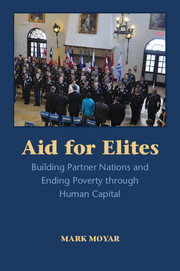Book contents
- Frontmatter
- Contents
- Preface
- Acknowledgments
- 1 Pathways to Development
- 2 How Governments Work
- 3 Civilization
- 4 Human Capital Development
- 5 Human Capital and National Security
- 6 Training
- 7 Militarization
- 8 Education in the Third World
- 9 Education in the United States
- 10 Support
- 11 Measurement
- 12 Conclusion: A New Foreign Assistance Strategy
- Notes
- Index
- Frontmatter
- Contents
- Preface
- Acknowledgments
- 1 Pathways to Development
- 2 How Governments Work
- 3 Civilization
- 4 Human Capital Development
- 5 Human Capital and National Security
- 6 Training
- 7 Militarization
- 8 Education in the Third World
- 9 Education in the United States
- 10 Support
- 11 Measurement
- 12 Conclusion: A New Foreign Assistance Strategy
- Notes
- Index
Summary
Because civil agencies are not as good as the military at achieving cultural change through training and never can be, the advisability of involving the military in training beyond the purely military sphere deserves consideration. Such involvement could include the training of military forces in law enforcement or other operations normally considered civil in nature. It could include the training of law enforcement organizations that fall under military or civil authority, or the training of governmental organizations of a strictly civil character. While the expansion of the military's writ is sometimes viewed as a formula for oppression, in reality it is more likely to reduce oppression and enhance the well-being of the civilian population.
MILITARIES IN INTERNAL AFFAIRS
Unlike the U.S. armed forces, numerous third world militaries routinely conduct security, governance, and development activities inside their own countries. At times, the U.S. government has encouraged foreign military organizations to engage in these activities and has provided resources to that end. At other times, American policymakers have taken the position that such problems should be handled exclusively by civil authorities, arguing that involving the military in domestic affairs will result in human rights abuses by soldiers and domination of the government by generals. “If you let the military get involved in internal affairs, you'll soon have a military dictatorship,” is an oft-heard refrain.
In truth, exclusive reliance on civil agencies to handle internal problems is a luxury that few poor countries can afford. The police and other law enforcement agencies in the third world are often too weak to deal with dire threats to security like organized crime and violent extremism. Private security firms, which have proliferated in the third world as the result of police ineffectiveness, have seldom been more effective than the police in dealing with major threats to the government or the general population, even if they may make life reasonably safe for the affluent. When the police cannot keep drug traffickers from leaving headless corpses along the roadside or ethnic militias from raping and torturing members of rival ethnic groups, governments must turn to the military for help.
- Type
- Chapter
- Information
- Aid for ElitesBuilding Partner Nations and Ending Poverty through Human Capital, pp. 114 - 134Publisher: Cambridge University PressPrint publication year: 2016

